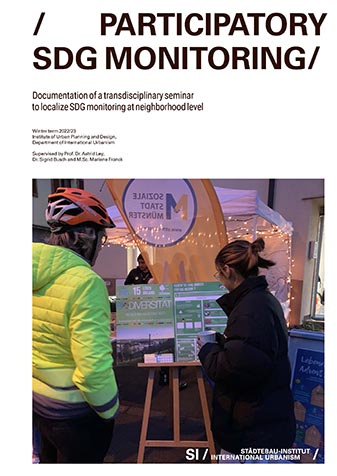Documentation of a transdisciplinary seminar to localize SDG monitoring at neighborhood level.
27 students from all over the world have summarized their theoretical research and experimental approach from a seminar held in the winter semester 2022/23 in this brochure:
On the way to more sustainability, the United Nations have adopted 17 global goals for sustainable development, which are to be implemented by cities and communities at the local level. In order to determine the extent to which cities are fulfilling these goals (and what tasks are still awaiting them), the Sustainable Development Goals (SDGs) are supplemented by a system of targets and indicators intended to monitor and evaluate the implementation process.
The city of Stuttgart is one of the pioneer cities in the field of monitoring these global sustainable development goals. For several years now, the city has been examining the extent to which the existing targets and indicators for surveying the implementation of SDGs are suitable for mapping the status of implementation of the sustainable development goals and, based on this, for developing measures to improve sustainability in Stuttgart. So far, however, this has been done mainly on the basis of quantitative data and at the city-wide scale; Approaches to transfer the evaluation to the smaller scale of districts or neighborhoods do not yet exist. Also, the possibility of including qualitative aspects (such as the quality of green and recreational areas and not just their square footage) in the evaluation is missing in the overall context. Therefore, the seminar “Participatory SDG monitoring” aims to make a methodological contribution to the further development of these SDG indicators by addressing the following questions:
- How could qualitative aspects be integrated into the SDG assessment and its indicator system?
- How could qualitative data be co-produced together with residents of a selected neighborhood?
- How could the indicator system be transferred from the larger municipal level to the smaller level of the district and the neighborhood?
Within the seminar, students critically reflected on the suitability of current SDG indicators for the district level in the context of urban regeneration projects. They took a close look at exit instruments for urban regeneration and their potential for SDG implementation and monitoring. Furthermore, the students developed participatory formats for (qualitative) data collection and tested these formats in the field. Finally, these results were evaluated. This report describes the work process within the context of the seminar and summarizes key findings.
Winter term 2022/23, Institute of Urban Planning and Design, Department of International Urbanism
Supervised by
Prof. Dr. Astrid Ley, Dr. Sigrid Busch and M.Sc. Marlene Franck
In collaboration with the City of Stuttgart
Dr. Bettina Bunk / Coordinator for the global sustainability goals at the City of Stuttgart, External Relations Department
Franziska Laue/ Department of Urban Planning and Housing, Soziale Stadt Stuttgart-Müster
Gritta Rotter/ Department of Urban Planning and Housing, Soziale Stadt Hallschlag
Renate Polinski/ District manager Stuttgart-Münster
Further experts
M.Sc. Simone Gretsch and Andreas Böhler/ Weeber und Partner, Institute for Urban Planning and Social Research
Funded by
The Ministry of Science, Research and the Arts
Baden-Württemberg (MWK B-W) in the framework of
Stuttgarter Change Labs



